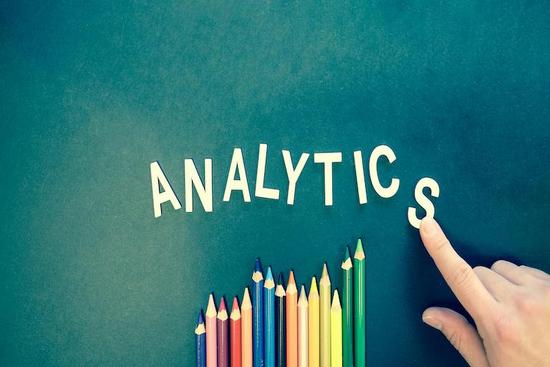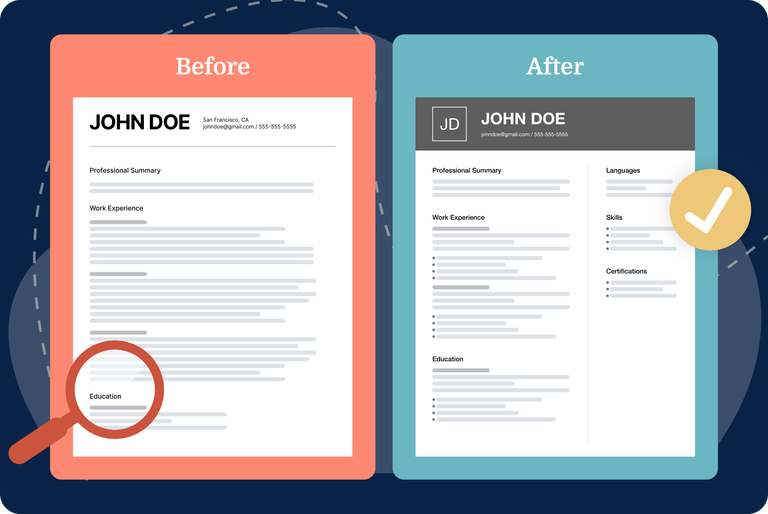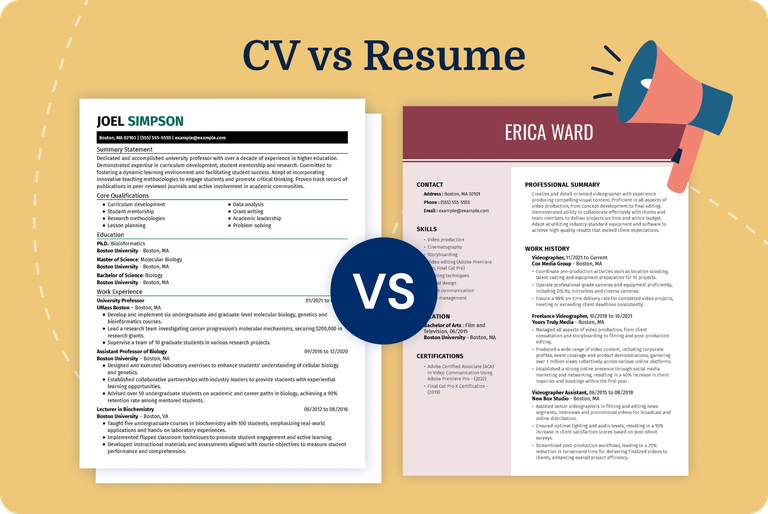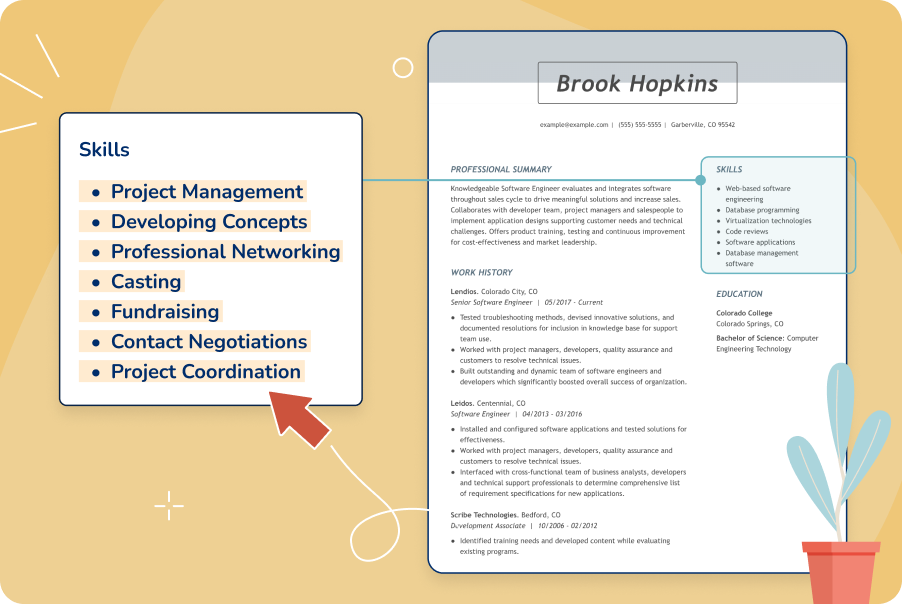Essential Analytics Skills for Your Resume (Guide & Tips)

Our customers have been hired at: *Foot Note
AI Resume Skills Generator
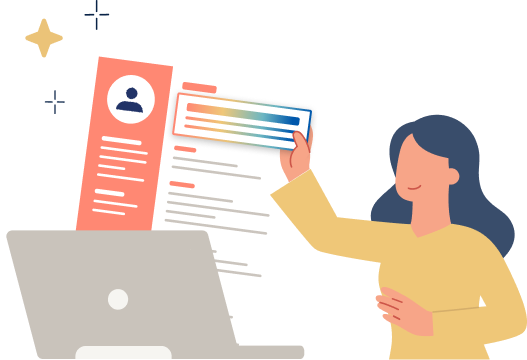
Analytics skills are critical in today's data-driven world. They enable professionals to derive insights, make informed decisions, and drive business success through data analysis. This guide explores various analytics skills, provides examples, and offers tips on showcasing them effectively on your resume to stand out in the competitive job market. In this guide, you’ll learn the top analytics skills to add to your resume and how to develop them to advance your career. Check out our guide on how to write a resume for guidance on displaying analytics skills in your resume.
What are analytics skills?
Analytics skills include collecting, interpreting and deriving meaningful insights from data to inform decisions and drive business outcomes. These skills help uncover trends, patterns and correlations within data sets, helping organizations make informed strategic decisions, optimize processes and identify opportunities for growth and efficiency improvements.
In today’s data-driven economy, analytics skills are increasingly important for job success across various sectors since businesses rely on data for measurable insights into consumer behavior, market trends, operational performance and financial metrics. Whether your job is focused on marketing analytics, financial analysis, operations management, or strategic planning, leveraging data effectively for successful business outcomes can distinguish you as a top performer and enhance your career prospects.
Here’s an example of a resume with analytics skills:
Top analytics skills for your resume
In today’s data-driven world, employers value workers with many different analytics skills, so the more you can showcase on your resume, the better your chances of getting your dream job. We recommend using a professional resume template to ensure your analytics skills stand out.
Here are our picks for the top analytics skills to highlight on your resume:
Data analysis and interpretation
- Statistical analysis: Proficiency in statistical methods and tools to analyze data distributions, correlations, and trends.
- Quantitative analysis: Ability to perform detailed numerical analysis to derive insights and make data-driven decisions.
- Data modeling: Experience in creating and interpreting models to predict outcomes and support decision-making processes.
- Regression analysis: Understanding and application of regression techniques to analyze relationships between variables.
- Predictive analytics: Skills in using historical data to forecast future trends and outcomes.
Data management and manipulation
- Database management: Knowledge of database systems and proficiency in SQL for querying, managing and analyzing large datasets.
- Data cleaning and preprocessing: Ability to clean, transform and prepare raw data for analysis, ensuring data quality and consistency.
- Data integration: Experience in combining data from multiple sources to create unified datasets for analysis.
- Extract, Transform, Load (ETL): Familiarity with ETL processes to integrate data from various sources into data warehouses or analytical systems.
Data visualization and reporting
- Data visualization: Proficiency in tools like Tableau, Power BI, or Python libraries (e.g., Matplotlib, Seaborn) to create clear and insightful data visualizations.
- Dashboard creation: Ability to design interactive dashboards that convey complex data insights in a user-friendly format.
- Report generation: Experience in generating comprehensive reports summarizing analytical findings and recommendations.
Programming and technical skills
- Programming languages: Proficiency in languages such as Python, R, or Java for data analysis, scripting and automation.
- Machine learning: Understanding of machine learning algorithms and techniques for predictive modeling and pattern recognition.
- Big data technologies: Familiarity with tools like Hadoop, Spark, or Kafka for processing and analyzing large-scale datasets.
See also: 100+ Essential Technical Skills for Your Resume & Tips to Showcase Them
Business acumen and communication
- Business intelligence: Ability to translate analytical findings into actionable insights that support strategic business decisions.
- Problem-solving: Strong analytical and critical thinking skills to tackle complex business challenges using data-driven approaches.
- Communication skills: Effective communication of analytical findings to stakeholders with varying levels of technical expertise.
See also:
Continuous learning and adaptability
- Learning agility: Willingness and ability to learn new tools, technologies and analytical methods to stay current in the field.
- Adaptability: Capacity to adapt analytical approaches to different industries, business problems and organizational needs.
Analytics skills by industry
Employers value analytics skills in every industry. We’ve curated a list of sought-after analytics skills for top industries to help you boost your resume. Explore our extensive library of resume examples for more ideas.
Accounting
- Financial statement analysis
- Cost-benefit analysis
- Budget variance analysis
- Forensic accounting analysis
- Tax planning and analysis
- Audit analytics
- Financial forecasting
- Risk management analysis
- Revenue recognition analysis
- Cash flow analysis
See also:
- Accounting Resume Templates & Examples
- Accounting CV Templates & Examples
- Accounting Cover Letter Templates & Examples
Construction
- Project cost estimation and analysis
- Schedule optimization
- Resource allocation and utilization
- Risk assessment and management
- Quality control and assurance
- Vendor and supplier performance analysis
- Safety analytics
- Equipment maintenance analytics
- Environmental impact analysis
- Post-project analysis
See also:
- Construction Worker Skills (Examples & Tips)
- Construction Resume Examples & Templates
- Construction CV Examples & Templates
Education
- Student performance analysis
- Learning analytics
- Assessment data analysis
- Retention analytics
- Educational data mining
- Teacher effectiveness metrics
- Budget and resource allocation analysis
- Enrollment forecasting
- E-Learning analytics
- Impact evaluation
See also:
Engineering
- Statistical analysis and quality control
- Predictive maintenance
- Finite element analysis (FEA)
- Process optimization
- Design and simulation analytics
- Energy efficiency analysis
- Failure mode and effects analysis (FMEA)
- Supply chain analytics:
- Data-driven decision making
- Environmental impact analysis
See also:
Food service
- Inventory management
- Sales and revenue analysis
- Customer segmentation
- Food cost analysis
- Menu analysis
- Supplier performance metrics
- Operational efficiency metrics
- Customer satisfaction analysis
- Forecasting and demand planning
- Food safety and compliance reporting
See also:
Health care
- Clinical data analysis
- Health care quality metrics
- Population health analytics
- Health care cost analysis
- Patient journey analysis
- Medical imaging analysis
- Health care fraud detection
- Clinical trials analysis
- Health care predictive modeling
- Telemedicine analytics
See also:
Information technology
- Network traffic analysis
- Cybersecurity incident analysis
- IT service management metrics
- Software usage analytics
- System performance monitoring
- IT asset management
- Cloud cost optimization
- IT project management metrics
- Data center capacity planning
- IT risk assessment
See also:
Marketing
- Market segmentation analysis
- Customer journey mapping
- Campaign performance analysis
- Digital marketing analytics
- Search engine optimization (SEO) analysis
- Social media analytics
- Email marketing analytics
- Customer behavior analysis
- Marketing attribution modeling
- Predictive analytics for marketing
See also:
- Marketing Cover Letter Examples & Templates
- Marketing Intern Cover Letter Examples & Guide & Templates
Sales
- Sales performance analysis
- Customer segmentation
- Sales forecasting
- Lead scoring and qualification
- Competitive analysis
- Sales territory optimization
- Churn analysis
- Sales funnel analysis
- Customer lifetime value (CLV) analysis
- Sales campaign ROI analysis
See also:
- Sales Skills for Your Resume (Examples & Tips)
- Sales Resume Examples & Templates
- Sales CV Examples & Templates
- Sales Cover Letter Examples & Templates
Make a resume with MyPerfectResume
Our Resume builder can help you write the perfect resume. Start Now!
Analytics skills by job title
Analytics enable us to make informed decisions and help drive success across all job titles. Here, we’ve created customized lists of key analytics skills for various jobs.
Accountant
Analytics skills enable accountants to think critically about financial statements, analyze data to identify potential issues and collaborate with colleagues to develop effective financial plans. We have many accountant resume examples and templates to help you create an impressive resume.
Here are a few analytics skills examples for your accountant resume to get hired faster:
- Accounting discrepancy analysis: Identifying and resolving accounting discrepancies through data analysis to ensure financial accuracy.
- Internal control development: Using data to develop and implement internal controls to mitigate risks and prevent fraud.
- Financial data analysis: Analyzing complex financial data to identify trends and opportunities for cost savings or revenue growth.
- Technical issue resolution: Troubleshooting technical issues with accounting software or systems through data analytics.
- Internal audits and reviews: Conducting data-driven internal audits to identify potential weaknesses in financial processes and controls.
Customer service representative
Customer service representatives must have exceptional analytics skills to identify and understand customer issues, adapt their responses based on data insights, and find data-driven solutions to specific pain points. Our customer service representative resume examples and templates can help you craft an effective resume.
Here are a few analytics skills examples for your customer service representative resume to stand out from the crowd:
- Complex inquiry resolution: Collaborating with team members and other departments using data to solve complex customer inquiries.
- Process improvement: Developing and implementing process improvements through data analysis to enhance customer experience.
- Technical troubleshooting: Using data to troubleshoot technical issues and provide guidance to customers.
- Managing difficult customers: Analyzing data to manage and de-escalate difficult or irate customers professionally.
- Proactive issue management: Anticipating potential customer issues through data analysis to prevent escalations.
See also:
Customer Service Skills: Examples and Tips for Your Resume
Data analyst
Analytics skills enable data analysts to interpret data critically, uncover insights, and collaborate with teams to inform strategic decisions. We have a variety of data analyst resume examples and templates to assist you in crafting a compelling resume.
Here are a few analytics skills examples for your data analyst resume to enhance your job search:
- Data discrepancy analysis: Identifying and resolving data discrepancies through thorough analysis to ensure data accuracy and integrity.
- Data quality management: Developing and implementing strategies to maintain and enhance data quality standards across databases.
- Data interpretation and visualization: Analyzing complex datasets to extract meaningful patterns and trends, and presenting insights using data visualization tools.
- Technical issue resolution: Utilizing data analytics to troubleshoot technical issues with data systems and platforms, ensuring smooth data operations.
- Performance metrics tracking: Creating and maintaining dashboards to track key performance indicators (KPIs) and metrics, enabling informed decision-making.
See also: Data analyst skills for your resume
Human resources manager
In addition to strong interpersonal skills, human resources managers must have excellent analytics skills to identify and understand the root causes of conflicts and adapt strategies based on data insights. Read our guide to writing a human resources manager resume for expert tips and examples.
Here are a few analytics skills examples for your human resources manager resume to land your dream job faster:
- Conflict resolution: Using data to resolve employee conflicts and disputes fairly and respectfully.
- Policy and procedure development: Developing and implementing data-driven policies to address workplace issues and promote a positive culture.
- Workforce data analysis: Analyzing workforce data and trends to identify potential issues and develop proactive strategies.
- Complaint Investigation: Conducting data-driven investigations into employee complaints to identify root causes and develop responses.
- Compensation and benefits analysis: Using data to develop and administer competitive compensation programs within budget constraints.
See also:
Graphic designer
In addition to possessing strong computer skills, graphic designers must have excellent analytics skills to adapt to their clients’ needs and design preferences. Check out our guide to writing an entry-level graphic designer resume if you're applying for your first job as a graphic designer.
Here are a few analytics skills examples for your graphic designer resume to impress prospective employers:
- Design issue analysis: Troubleshooting design issues and using data to find innovative solutions ensuring visual consistency and quality.
- Project management: Analyzing data to manage multiple projects simultaneously, prioritizing tasks to meet deadlines.
- Client feedback analysis: Using data to analyze feedback and revise designs to ensure client satisfaction.
- Budget and resource management: Finding creative solutions to design challenges using data within budget constraints.
- Technical troubleshooting: Using data to resolve technical issues with design software or hardware to ensure smooth workflow.
Registered nurse
Strong analytics skills are critical for registered nurses as they provide care for patients with complex health issues. Nurses must be able to identify patient needs, adapt care plans to changing situations, and find data-driven solutions to unexpected challenges. Explore our library of registered nurse resume examples and templates to get your resume started.
Here are a few analytics skills examples for your registered nurse resume to rise above the competition:
- Patient needs assessment: Analyzing patient data to prioritize needs in a fast-paced and high-pressure environment.
- Medication error analysis: Identifying and resolving medication discrepancies or errors to ensure patient safety through data analysis.
- Emergency response analytics: Using data to respond quickly and effectively to emergency situations.
- Medical equipment data analysis: Troubleshooting equipment malfunctions and implementing data-driven solutions while awaiting repairs.
- Conflict management through data: Using data to de-escalate conflicts and manage challenging patient or family situations empathetically.
Teacher
Effective analytics skills are essential for teachers as they encounter various challenges in the classroom, such as personalizing lesson plans and improving student outcomes through data-driven insights. Our professional teacher resume examples and templates will help you get one step closer to your dream job.
Here are a few analytics skills examples for your teacher resume to impress hiring managers:
- Developing data-driven lesson plans: Using student performance data to create lesson plans that engage students and accommodate different learning styles.
- Communicating insights: Effectively sharing data findings with students, parents, and colleagues to address concerns and improve educational strategies.
- Adapting teaching methods: Utilizing analytics to meet the needs of students with diverse abilities or backgrounds.
- Behavioral data analysis: Identifying and addressing behavioral issues using data to promote a positive learning environment.
- Providing individualized support: Analyzing academic data to offer targeted support and resources to students struggling academically or personally.
See also:
Social worker
Strong data analytics skills are crucial for social workers as they navigate various client challenges and ensure effective, evidence-based interventions by quickly assessing data and finding effective solutions. For more social work skills, read our guide to social work skills for a resume, and explore our entry-level social work resume examples for help crafting your beginner social worker resume.
Here are a few analytics skills examples for your social worker resume to wow employers:
- Client needs assessment: Using data to identify and address the needs and risks of clients, ensuring appropriate support and resources.
- Case resolution: Analyzing data to resolve client issues and improve their well-being, ensuring effective and reliable interventions.
- Service performance optimization: Using data to respond to service delivery bottlenecks, assessing and optimizing the efficiency of support services.
- Program quality assessment: Conducting data-driven evaluations and assessments to identify and improve the quality and effectiveness of social programs.
- Outcome monitoring: Analyzing client outcome data to assess the impact of interventions and determine areas for improvement.
Software engineer
Strong data analytics skills are crucial for software engineers as they navigate various technical challenges and ensure robust, efficient software solutions by quickly assessing data and finding effective solutions. We have software engineer resume examples and templates to help you get your career off the ground.
Here are a few analytics skills examples for your software engineer resume to wow employers:
- Security vulnerability analysis: Using data to identify and address security vulnerabilities and risks in software applications.
- Bug resolution: Analyzing data to resolve software bugs and performance issues, ensuring smooth and reliable software operation.
- System performance optimization: Using data to respond to performance bottlenecks, assessing and optimizing system efficiency.
- Code quality assessment: Conducting data-driven code reviews and assessments to identify and improve code quality and maintainability.
- User behavior monitoring: Analyzing user interaction data to assess application usage patterns and determine areas for enhancement.
How to highlight analytics skills on your resume
Highlighting analytics skills on your resume shows potential employers you are an analytical thinker, pay attention to detail and can help them drive strategic outcomes for their business.
Here are some tips for showcasing your analytics skills in your resume.
Highlight analytics skills in your resume summary or objective
Include your analytics skills in your resume to make a strong first impression and capture employers’ interest.
Here’s a good example of a resume summary focused on analytics skills:
If you are applying for a job with no experience, write a resume objective with relevant analytics skills to get your foot in the door.
Here’s a great example of a resume objective highlighting analytics skills:
Create categories for your skills
Create a dedicated skills section on your resume and categorize your skills to emphasize them. For example:
Skills
Analytical Skills
- Data interpretation
- Statistical analysis
- Data visualization
- Predictive modeling
Technical Skills
- Database management
- Statistical analysis
- Machine learning
- Data visualization
Soft Skills
- Communication
- Teamwork
- Leadership
- Adaptability
If you have limited professional experience, analytics is an excellent transferable skill to list on your resume.
Quantify your achievements
Using measurable achievements to highlight your analytics skills in your resume and cover letter effectively showcases how you can use your skills to contribute to an organization’s success.
Here are a few examples of quantifiable achievements that demonstrate strong analytical capabilities:
- Analyzed sales data to develop a pricing strategy that increased revenue by 15% and improved profit margins by 10%.
- Implemented a predictive analytics model that forecasted customer demand with 95% accuracy, optimizing inventory levels and reducing excess stock by 20%.
- Developed and executed a data-driven marketing campaign that improved lead conversion rates by 25% and reduced customer acquisition costs by 30%.
- Streamlined reporting processes by creating automated dashboards, reducing report generation time by 50% and increasing data accuracy.
- Conducted customer segmentation analysis that identified high-value customer groups, resulting in a 20% increase in targeted marketing ROI.
Use Action Words to Showcase Your Skills
Incorporating action words throughout your resume is an effective way to give your analytics skills more impact.
Here are a few examples of powerful action verbs to describe your analytics skills.
- Analyze
- Assess
- Create
- Design
- Develop
- Evaluate
- Forecast
- Identify
- Implement
- Interpret
- Investigate
- Model
- Monitor
- Optimize
- Predict
- Quantify
- Streamline
- Visualize
How to improve your analytics skills
Improving your analytical skills is essential for staying competitive in today’s job market. Here are some strategies to enhance your analytical abilities:
Pursue formal education and training: Take online or in-person courses in data analytics, statistics, and related fields and pursue industry-recognized certifications to validate your skills.
Learn and use analytical tools: Gain proficiency in analytical tools and software, essential for data manipulation, visualization, and analysis, and open data sets to practice your analytical skills and apply theoretical knowledge to real-world scenarios.
Develop strong statistical and mathematical foundations: Learn about probability, hypothesis testing, regression analysis and other statistical techniques. Enhance your mathematical skills, particularly in areas like linear algebra and calculus, often used in advanced data analysis and machine learning.
Engage in hands-on projects: Identify problems or questions of interest, use data to explore and find solutions, and join data analysis and machine learning competitions to test your skills against others and learn from the community.
Stay updated with industry trends: Read industry-related blogs, journals, and publications to learn about the latest trends, tools, and techniques in data analytics.
Participate in professional groups and forums to network and learn from peers.Develop critical thinking and problem-solving skills: Regularly engage in activities that require critical thinking and problem-solving, such as puzzles, brainteasers and strategic games, and analyze case studies from various industries to understand how data analytics is applied to solve real-world problems.
Gain industry-specific knowledge: Learn about your industry’s analytical needs and challenges. Focus on analytics skills and tools that are particularly relevant to your industry to provide more targeted and effective insights.
Common tools and technologies for analytics skills
In our data-driven world, proficiency in analytics tools and technologies is vital across industries. From foundational tools like Excel and SQL for data manipulation to advanced platforms such as TensorFlow for visualization and machine learning, mastering these technologies is essential for enhancing your analytical skills.
Here are some common tools to develop your analytics skills:
1. Data analysis and manipulation
- Excel: Widely used spreadsheet software for data organization, analysis and visualization.
- SQL (Structured Query Language): Standard language for querying and managing relational databases.
- Python: Versatile programming language with libraries like Pandas and NumPy for data manipulation and analysis.
- R: Statistical computing language used for data analysis, statistical modeling and visualization.
- MATLAB: High-level programming language and interactive environment for numerical computation and visualization.
2. Data visualization
- Tableau: A leading data visualization tool for creating interactive and shareable dashboards.
- Power BI: Business analytics service by Microsoft for creating interactive reports and visualizations.
- QlikView / Qlik Sense: Business intelligence and data visualization platforms for interactive analytics.
- Matplotlib / Seaborn: Python libraries create static, animated, and interactive visualizations.
- D3.js: JavaScript library for producing dynamic, interactive data visualizations in web browsers.
3. Statistical analysis and modeling
- SPSS (Statistical Package for the Social Sciences): This software suite is used for statistical analysis in social sciences.
- SAS (Statistical Analysis System): Integrated system of software products for data management and analytics.
- Stata: Statistical software for data analysis, data management and graphics.
- JMP: Statistical software for dynamic data visualization and exploration.
- Python (SciPy, Statsmodels): Libraries for statistical analysis, hypothesis testing and modeling.
4. Machine learning and big data tools
- TensorFlow / Keras: Open-source libraries for machine learning and deep learning applications.
- Scikit-learn: Simple and efficient tools for data mining and data analysis in Python.
- Hadoop: Framework for distributed storage and processing of large data sets.
- Spark: Unified analytics engine for big data processing, with built-in modules for streaming, SQL, machine learning and graph processing.
- AWS (Amazon Web Services) / Azure: Cloud platforms that offer scalable data storage, processing and analytics solutions.
Best analytics certifications
Certifications in analytics can significantly enhance credibility and job prospects by validating skills and knowledge in data analysis, visualization and machine learning. Here are some of the best certifications recognized in the analytics field:
- Certified Analytics Professional (CAP)
- Data Analyst Nanodegree
- Microsoft Certified: Azure Data Scientist Associate
- Google Data Analytics Certificate
- SAS Certified Data Scientist
- IBM Data Science Professional Certificate
Key takeaways
- Analytics skills are essential in today's data-driven economy. They enable professionals to derive insights and make informed decisions across various sectors.
- Key analytics skills include data analysis, statistical interpretation, data management, visualization and proficiency in programming languages and big data technologies.
- These skills are applicable in diverse industries, such as healthcare, IT, marketing, and finance, and they address specific needs, such as patient data analysis and market segmentation.
- To enhance analytics skills, professionals should pursue formal education, gain proficiency in analytical tools, and stay updated with industry trends.
- Highlighting analytics skills on resumes involves quantifying achievements, using action words, and emphasizing proficiency in relevant tools and certifications.
- Certifications like CAP, Google Data Analytics Certificate, and proficiency in tools like Excel, SQL, Python, and Tableau enhance job prospects and credibility in analytics.
FAQ
What are analytics skills and why are they important?
Analytics skills involve collecting, interpreting and deriving insights from data to inform decisions. They are crucial in today’s data-driven economy as they help businesses optimize processes, identify growth opportunities and make strategic decisions based on data.
Which industries benefit most from analytics skills?
Analytics skills are valuable across various industries including healthcare, IT, marketing, finance, education and engineering. They are used for purposes such as patient data analysis in healthcare, market segmentation in marketing, and predictive maintenance in engineering.
How can I showcase analytics skills effectively on my resume?
To showcase analytics skills on your resume, create a dedicated skills section highlighting specific skills like data analysis, statistical interpretation, data visualization, and proficiency in relevant tools such as SQL, Python and Tableau. Quantify achievements using metrics like revenue increases or efficiency improvements.
What are some tips for improving analytics skills?
Improve analytics skills by pursuing formal education in data analytics or related fields, gaining proficiency in analytical tools such as Excel, SQL and Python, participating in hands-on projects or competitions, and staying updated with industry trends through blogs and professional groups.
What role do analytics skills play in problem-solving and decision making?
Analytics skills play a critical role in problem-solving and decision-making by providing insights into complex issues, identifying patterns and trends, predicting outcomes and guiding strategic actions based on data-driven evidence.
How do I demonstrate analytics skills in a job interview?
In a job interview, you can demonstrate your analytics skills by discussing specific projects or experiences where you applied data analysis techniques to solve problems or achieve goals. Share examples of how you collected and interpreted data, used statistical methods or software tools to derive insights, and ultimately influenced decision making or improved processes. Highlighting the outcomes of your analytical work, such as cost savings, revenue growth, or efficiency improvements, will further emphasize your capabilities to the interviewer.
How can I showcase my analytics skills in a cover letter?
To effectively showcase your analytics skills in a cover letter, focus on specific achievements where you utilized data analysis tools and techniques to drive results. Highlight your ability to interpret data, make informed recommendations, and impact business outcomes. Quantify your achievements whenever possible to demonstrate the tangible value you bring through your analytical abilities.
Our customers have been hired at:*Foot Note

